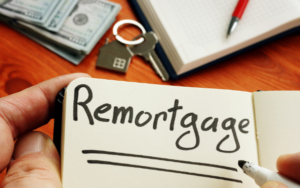
Homeowners have taken advantage of record-low mortgage rates in recent years to remortgage and move to cheaper repayments or release much-needed cash locked up in their property. However, rising interest rates over the last year have caused mortgage repayments to become inflated as homeowners come to the end of fixed-term deals. For some, the equity within their homes may be a useful resource when it comes to tackling the increased cost of living and mortgage interest rates.
In this article we explain how remortgaging works, when you should consider remortgaging, how much you can borrow when remortgaging and what it costs to remortgage.
1 minute summary - How much can I remortgage my house for and what is the cost?
- Remortgaging is no longer as easy as just switching your current mortgage and taking advantage of any increased equity in your home.
- It pays to seek the advice of an independent mortgage adviser who can secure the best remortgage deal for you.
- If you don't know a mortgage adviser whose opinion you trust, you can get your mortgage reviewed for free online through Habito*, one of the first online mortgage brokers in the UK and regulated by the FCA.
- Habito checks over 20,000 mortgages from more than 90 mortgage lenders for you before making a recommendation.
- The whole process can be carried out online and over the phone (without the need for face-to-face meetings).
- Alternatively, follow these simple steps to secure a free mortgage review* from a vetted, FCA-regulated mortgage professional near you.
How does remortgaging work
Your mortgage is normally the most expensive outgoing from your bank account. It is worth asking your existing lender about remortgage deals as you may be offered preferential rates as an existing customer, but it is also worth shopping around so you can compare the costs.
A new lender, or even your existing bank or building society would look at how much is left to pay on your current deal, the value of your property and your income and expenses and will come up with a new package that will essentially pay off and replace your old one.
Homeowners can remortgage at any time but may have to consider early repayment charges if they do so before reaching the end of a fixed deal. The most common reason is to move to a different fixed-term deal once the current mortgage deal has come to an end. If you do not switch to a new mortgage deal your lender will usually start charging the standard variable rate (SVR) which may be higher than a rate you can secure by remortgaging. This would typically mean remortgaging for the amount that is still owed on your current mortgage.
But there are other uses for a remortgage. You could also use it to release cash. You can remortgage for home improvements, to build an extension, to pay off debts or even to buy another house if you have enough equity in your current home or can borrow enough.
In these cases, you would need to take out a bigger mortgage than what you are currently borrowing and draw down the portion above what is needed to cover your property for yourself. The rest would become your new mortgage.
As you are taking a larger loan you would end up paying a more expensive repayment on your mortgage but this can be a good way of releasing cash that has become tied up in your home if your house price has risen in recent years. For more information on remortgaging, check out our article “How to remortgage your house“.
When you should consider remortgaging
Most mortgage borrowers remortgage at the end of a deal term. This is to avoid moving onto the – typically high – Standard Variable Rate (SVR).
Some homeowners mistakenly stick with their high SVR due to inertia, rather than locking in a better rate by moving onto a new fixed-rate deal.
The Bank of England's base rate is a key indicator of changes to the interest rate charges on mortgage lending. If the Bank of England raises the base rate, those on tracker deals would see their costs rise, while mortgage lenders could also increase their pricing on both their fixed rate and tracker deals as the cost of funding on the wholesale markets may also be pushed higher.
It is also worth considering a remortgage when you have a big event such as a wedding or a project such as home improvements to spend money on. Rather than raiding your savings, you could benefit from the increase in your property to take some cash out.
This would result in a larger mortgage and higher interest rate so it is only really worth it if your home has gone up by quite a lot and you can release a significant amount, and obviously, if you can afford the repayments. It is a good idea to weigh up the cost benefits by comparing the extra borrowing costs that you will take on versus what you may earn in savings rates.
When you should not consider remortgaging
The grass may seem greener on the other side, but sometimes it may be more restrictive to move from your current deal if you are only a year or so into it.
Most fixed-rate mortgages have early repayment charges if you leave before the end of the deal term. These can be up to 5% or more of the outstanding value of the mortgage. There will also be legal, survey and possible broker fees for arranging the remortgage. If all these costs outweigh the savings, then it may not be worth considering a remortgage. Check out our article ‘How to avoid mortgage early repayment charges‘.
How much can you borrow when remortgaging?
A homeowner would typically borrow the equivalent amount that is outstanding on their current loan for a remortgage if they are switching to a new rate, but they may borrow more if using the product to release equity built up in the property. Alternatively, some homeowners who wish to reduce their mortgage balance may choose to do this at the point of remortgaging before entering into a new fixed-term mortgage contract – this would reduce the mortgage balance and may avoid early repayment charges.
Whatever the money is used for, a remortgage is treated as a new mortgage application and is usually subject to the income multiple limits with your lender. Mortgage lenders will usually offer up to 4.5 times your income as a mortgage amount but this multiple varies depending on the lender and your personal financial commitments. Your chosen bank or building society would look at your application and your income, expenses and credit rating, as well as the value of your current home to decide how much you can remortgage your house for.
This is where it gets a bit tricky. Your proposed lender can’t dispute how much is left to pay on your current mortgage, but this is only a starting point for deciding how much you can remortgage your house for. The lender will want to conduct their own valuation of your home and if there are disputes over the value of your property this could affect the loan-to-value (LTV). A lender may insist on lending you less if you hit its LTV limits or it may require that you make up any shortfall.
How much does it cost to remortgage?
When shopping around for the best remortgage deals you have to consider any arrangement or product fees the lender charges as well as the cost of conveyancing and surveys to complete the transaction if this is something that will be needed. The costs incurred in switching to a new lender when you remortgage may be greater than those you would be required to pay if you simply switched to a new mortgage product with your existing lender, referred to as a product transfer. However, you should weigh up the mortgage deal as well as the initial costs before deciding which is right for you.
Your current lender may charge an exit fee and/or early repayment costs if you switch before the end of a deal, but there is usually nothing to pay if you have come to the end of a fixed-term mortgage deal. If you use a mortgage adviser to arrange your deal, there may also be broker fees. We explain fees in more detail in our article “How much are the fees when buying a house“.
Things to consider when deciding to remortgage?
Your remortgage will give you a new rate and monthly amount to repay each month so you need to ensure you can afford it.
It is best to seek remortgage advice* so that an intermediary can assist you in sourcing the best remortgage deals. You can get started by using our mortgage rate comparison tool that allows you to compare mortgage deals based on your specific needs and details – just remember to set the tool to ‘remortgage' at the top of the page when searching.
The interest rate is an important factor, but also consider any fees associated with the new mortgage as this will push up the cost. Some lenders may also offer cash incentives and these are detailed alongside the mortgage deal information.
You should also think about the type of product you remortgage to. A fixed rate is likely to be the cheapest but may have high fees and you could end up with more expensive deals when it comes to remortgaging again at the end of the term. A long-term fixed mortgage deal for, say 5 or 10 years gives you longer-term security but there is the risk that rates and pricing fall during that period so you may feel that you are paying too much and lost out on better deals.
The value of your home is important when deciding to remortgage as this will dictate the LTV. You may think your property has soared in value, giving you lots of equity, but lenders will have their own policies on the maximum LTV they will lend. They may value your property differently to you and this could mean taking out a mortgage for longer or making up any shortfall to give the lender more security. The best remortgage rates are usually offered at the lower end of LTVs and you will usually find that a 60% LTV mortgage will get you the best rate.
Alternatives to remortgaging?
A remortgage isn’t the only option if you just want to release cash from your property.
It is worth weighing up the costs and benefits of getting a personal loan or remortgage. There is usually a choice of repaying a personal loan over 1, 2 or 5 years, whereas a mortgage is worked out over a longer period, often for up to 30 years or more. This makes paying off a remortgage cheaper based on the monthly payments you will be committed to making, but the process of getting a personal loan is slightly less tricky.
Lenders will typically use your credit report and will ask some questions about your income and expenditure but there may not be the same scrutiny as with a mortgage application.
The application process for a personal loan can also be faster. Much of it is done online so often decisions can be made online in minutes and you could receive the funds within a few days. In comparison, a mortgage interview can take around 2 hours and then you may have to wait around a month while the lender processes the application through its compliance department and values your property before coming back with an offer.
A personal loan is generally faster as they are for lower amounts and are unsecured so there is no property to value. There are also more options for personal loans as you could get one from a bank or building society or even through a peer-to-peer platform. You may not always be offered the advertised rate on a personal loan though as lenders only have to supply the advertised rate to 51% of applicants.
If a link has an * beside it this means that it is an affiliated link. If you go via the link, Money to the Masses may receive a small fee which helps keep Money to the Masses free to use. The following link can be used if you do not wish to help Money to the Masses – VouchedFor, Habito





